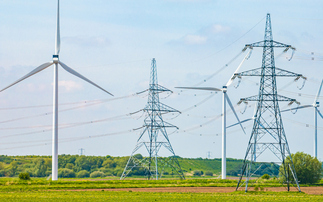The decision to approve an opencast coal mine runs completely counter to the government's climate strategy - it should be reversed as swiftly as possible
Anger is rarely a constructive emotion, but sometimes it is hard not to succumb. The decision by Northumberland County Council yesterday to approve plans for a giant opencast coal mine near Druridge Bay on the Northumberland Coast is one of the most reckless, short-sighted, and irresponsible environmental moves in years. I cannot remember a worse UK environmental decision in the nine years BusinessGreen has been going. I am apoplectic. I imagine many others feel the same.
The reason this project and its planning approval are so rage-inducing is that the usual caveats and justifications that can be deployed in defence of new fossil fuel infrastructure simply do not apply.
The transition away from an economy driven by polluting fossil fuels to one driven by clean energy is an immensely complex, era-spanning undertaking. Consequently, fossil fuels will continue to be needed for several decades to come and investment in their extraction can, under certain circumstances, be justified.
The lowest-cost oil and gas projects can still make sense given they are unlikely to become stranded assets, unlike those higher-cost projects that look extremely risky when set against predictions for falling demand. Even fracking projects can be defended if governments can demonstrate gas is acting as a "bridging fuel" and parallel investment is being mobilised in the renewables, green heat, and carbon capture systems that will provide a landing site for that particular "bridge". Personally, I maintain that the UK's safeguards for ensuring fracking infrastructure is a temporary phenomenon are nowhere near strong enough, but at least frackers can call on a semi-credible case for the defence.
This is quite simply not the case for new coal projects in industrialised countries. There is no justification. No defence. Unabated coal is the most carbon-intensive energy source available. It's rapid phasing out, first in industrialised economies and then globally, is a prerequisite to tackling climate change.
It is also, to all intents and purposes, a legal requirement under the UK Climate Change Act and the Paris Agreement. There is no credible way to comply with the country's international and domestic climate change obligations without ending the use of unabated coal power, which is why the government last year pledged to phase out the use of such power by 2025 at the latest.
And then there is the economic and technological context. The coal market is in the doldrums, hamstrung by lower than expected demand from Asia as China's clean energy transition gathers pace and the gradual phasing out of coal power across much of Europe. You would be hard pressed to find a sensible analyst who thinks this trend is likely to reverse any time soon. Ever-more demanding air-quality regulations and the emergence of increasingly cost-competitive clean energy alternatives - only this week DONG Energy reported its next offshore wind farm will deliver power at €72.70/MWh, about half the level recorded just a few years ago - make a coal market recovery extremely unlikely. This is great news.
Against this backdrop, the only way to potentially justify new coal extraction in the UK would be through the emergence of coal-fired power stations with CCS capabilities. But that ship sailed last autumn when the government axed its £1bn carbon capture competition - a decision as short-sighted as the coal phase-out commitment was enlightened. A new CCS strategy may come forward, but the focus for the industry now is likely to be on CCS fitted to gas power stations and industrial plants. Coal's role in the UK economy has been condemned to history and heritage railways.
All this leaves Banks Group trotting out tired economic arguments in defence of a project that looks increasingly indefensible. "What's really important for Northumberland is job creation and making sure we continue to support the economy," a spokeswoman for the company told the BBC. This is of course true, but there are multiple ways to create jobs and support the economy, and most of them don't require the extraction of one of the world's dirtiest and most polluting fuels in apparent defiance of the country's stated strategic goals.
The project will reportedly employ around 100 people and deliver £48m for local businesses. It is staggering that the environment of Northumberland is being sold so cheaply. Any number of clean-tech programmes and investment can and do create far more jobs, while delivering more sustainable economic benefits. Approving a coal project in the current climate is akin to turning down a planning application from Google for a new R&D centre in favour of a small factory making fax machines. It is both senseless and irresponsible. As David Cameron said only today in the House of Commons in response to a question about the coal industry, "we're never going to succeed as a country if we hold on to jobs where industry has become uncompetitive".
But if you are going to get angry about this decision, then that anger has to be appropriately directed. As is so often the case in the energy and climate field, the problem is not so much with any individual company, council, or decision maker, but with the system that allows damaging, short-termist decisions to be taken.
In making its decision, Northumberland County Council has been hampered by planning guidance that runs counter to the government's coal phase-out policy. Under current planning rules, coal is still defined as a "mineral of national importance". As Labour's new shadow energy and climate change secretary Barry Gardiner has highlighted in a letter to communities secretary Greg Clark, the National Planning Policy Framework (NPPF) specifies planning permission by mineral planning authorities "should not be given for the extraction of coal unless the proposal is environmentally acceptable, or can be made so by planning conditions or obligations; or if not, provides national, local or community benefits which clearly outweigh the likely impacts to justify the grant of permission".
I would argue, as thousands of others have done, that the proximity of the coal mine to the beautiful habitats of the Northumberland coast mean this condition has not been adequately met and the project should have been rejected. But the council decided otherwise and, as Gardiner points out, the planning rules do not cite climate change as a factor for determining environmental acceptability.
It is clear that the planning guidance needs changing so that planning authorities take account of climate change when considering coal-related decisions, just as it is clearly contradictory for a government committed to a phase-out of coal power to allow the approval of coal-extraction projects. In the interim, the government should call in the planning approval and reverse it as a matter of urgency.
There is no place for unabated coal in a modern, competitive low-carbon economy. Any decision that runs counter to this simple reality deserves to be challenged every step of the way. As campaigner Bill McKibben tweeted in the wake of the Paris Agreement: "Leaders adopt 1.5°C goal - and we're damn well going to hold them to it. Every pipeline, every mine: 'You said 1.5!'"
It is time to channel some of the anger at this reckless, Paris Agreement-defying move as constructively as possible.










